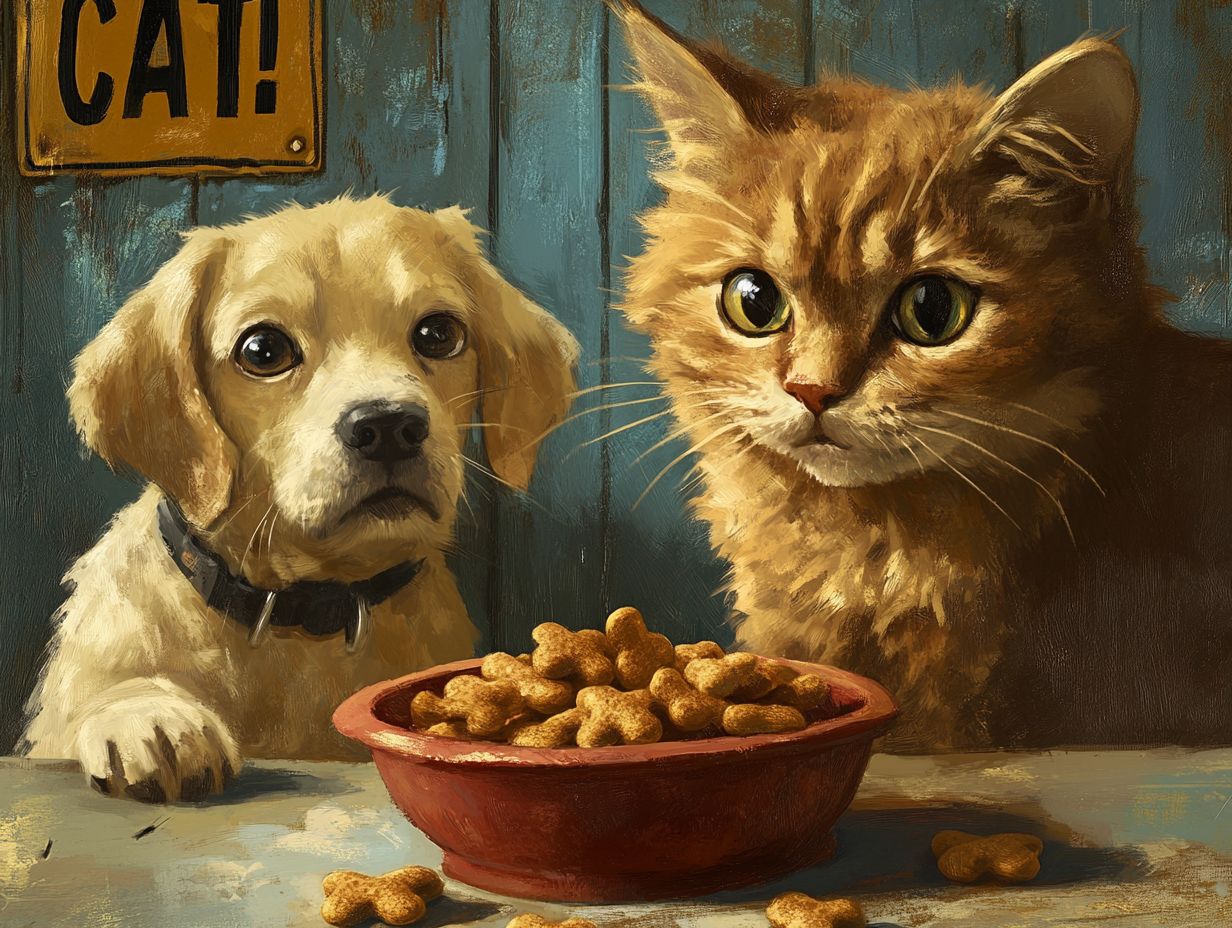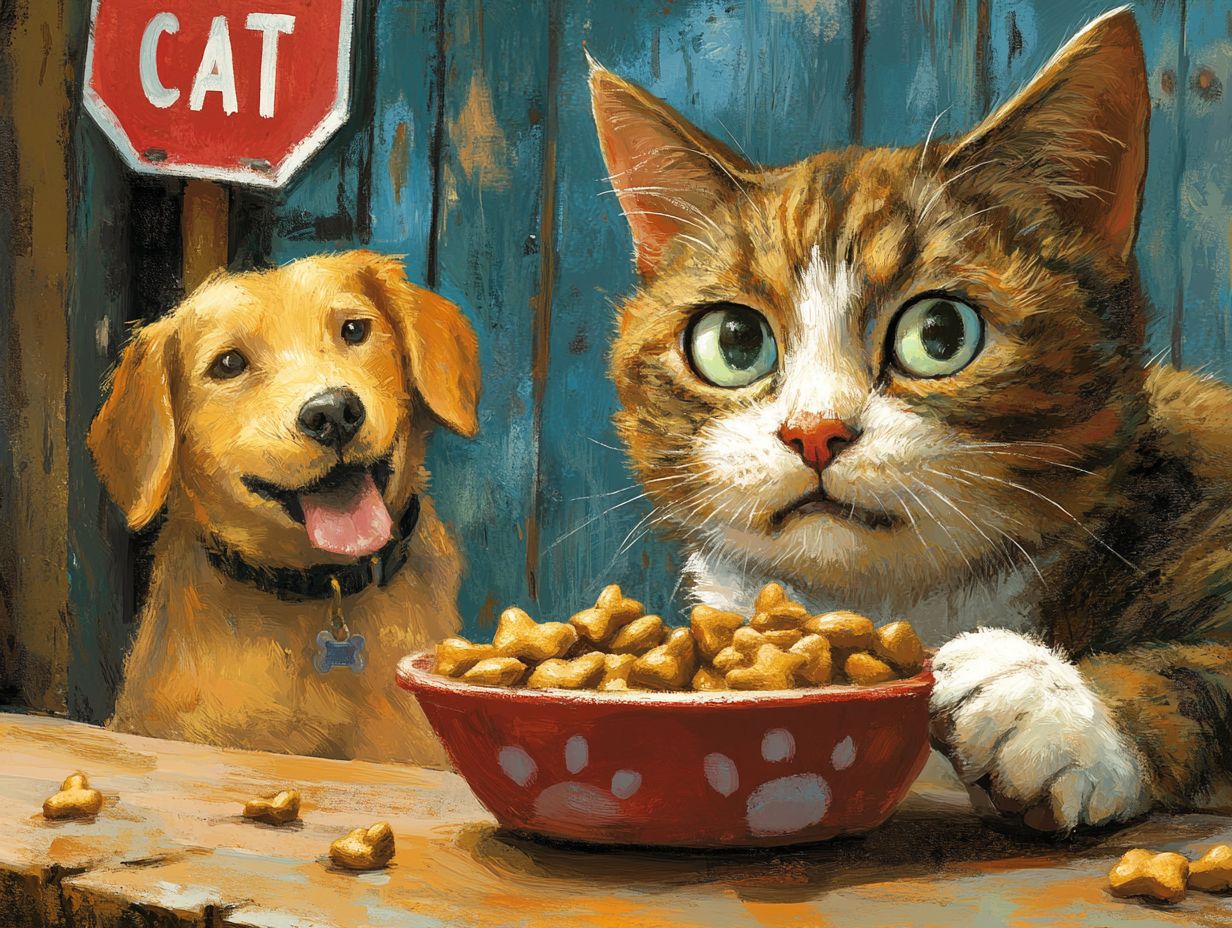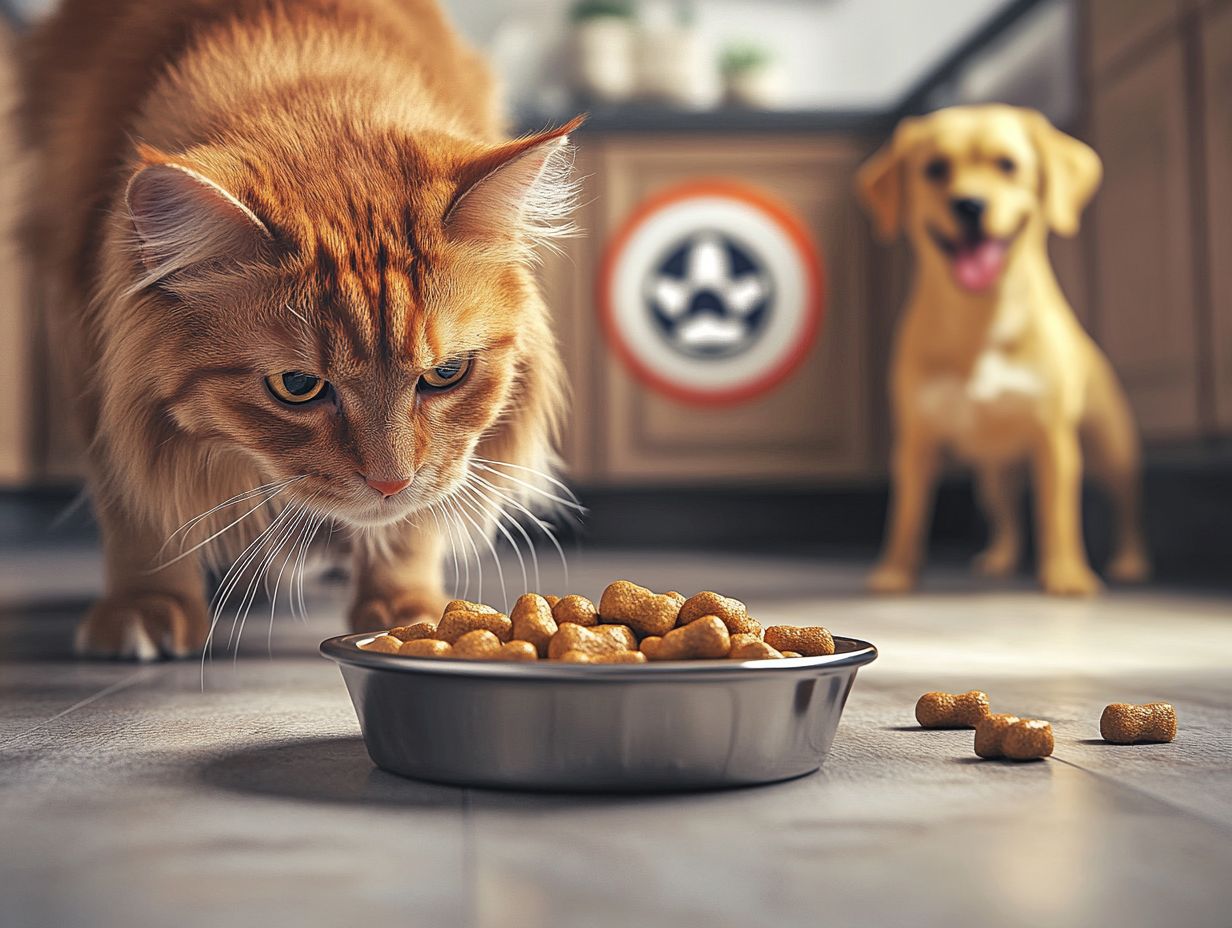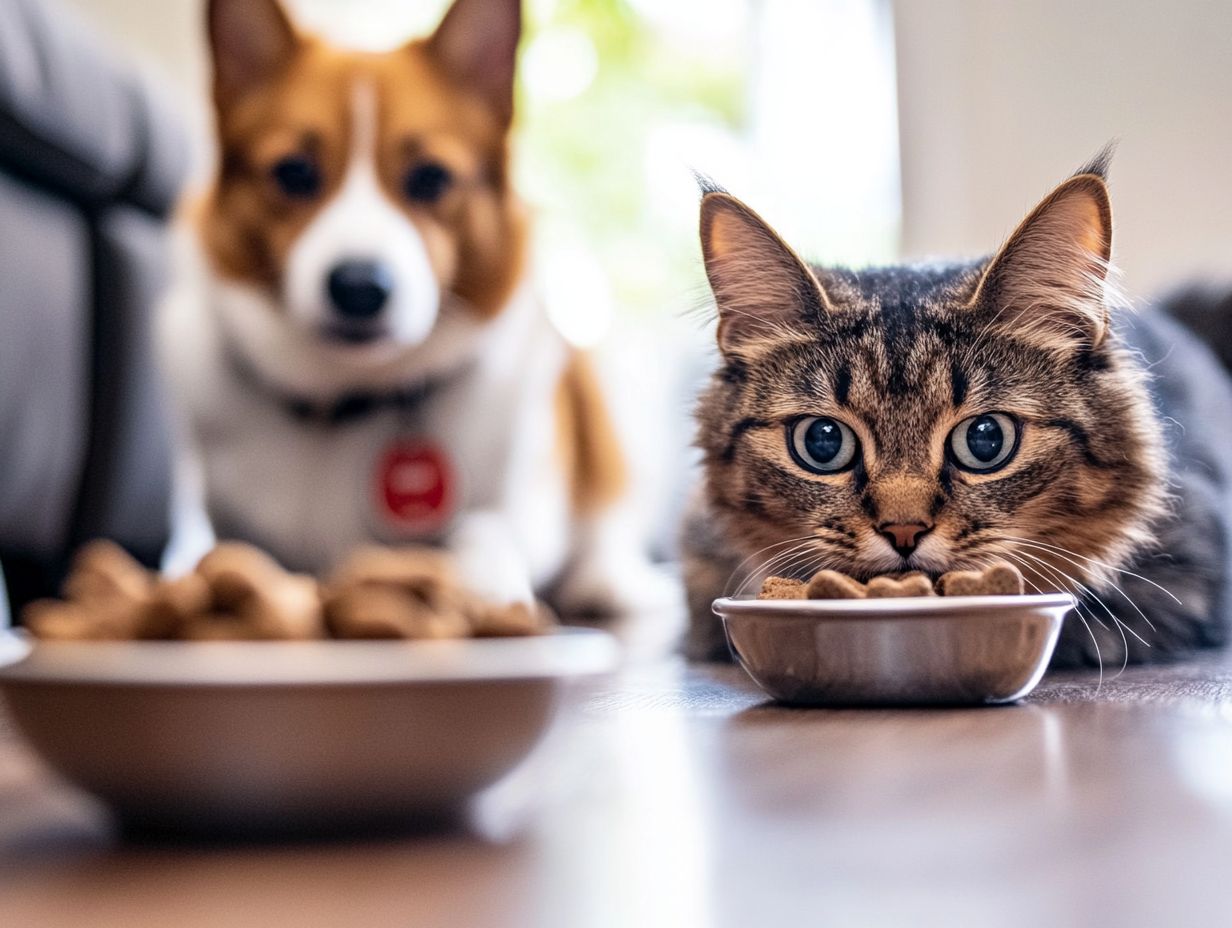If you’re wondering whether your cat can eat dog treats, the short answer is no. Dog treats are not formulated for feline dietary needs and can pose serious health risks, including digestive issues and nutrient imbalances.
This discussion explores the potential risks associated with cats eating dog treats, highlights safer alternatives like cat treats, and shares strategies to keep your curious kitty away from the canine goodies.
Join us as we navigate this crucial aspect of pet care!
Key Takeaways:

- Cats should not eat dog treats due to potential health risks, such as digestive issues and nutrient imbalances.
- Safe and appropriate alternatives for cats include specialized cat treats, cooked lean meats like chicken and turkey, and cat-safe human foods.
- To prevent your cat from accessing dog treats, store them in a secure location and supervise pets during treat time. Providing your cat with proper nutrition, including healthy snacks like catnip, is essential for their overall health and well-being.
The Question: Can Cats Eat Dog Treats?
The question of whether cats can eat dog treats raises important concerns about the nutritional needs, food preferences, and overall health of our pets. While both cats and dogs have specific dietary requirements, the ingredients and protein content in dog treats are not formulated for feline consumption.
This discussion encompasses varying perspectives on the benefits of treats for pets, the potential dangers of feeding them inappropriate foods, and the significance of adhering to appropriate feeding guidelines to ensure our pets remain healthy. Achieving a balance between pet enjoyment and nutritional adequacy is essential for their proper care. For more information on cat treats and dog treats, check out Can Cats Eat Dog Treats? Understanding the Risks.
Different Perspectives and Opinions
The diverse perspectives on whether cats can eat dog treats underscore the importance of considering the needs of both species when selecting pet food and treats. Some pet owners believe that certain ingredients, especially in small amounts, may not be harmful to a cat’s health. However, others emphasize that adhering to the specific dietary requirements, energy needs, and food preferences of each animal is essential for their health and safety.
Veterinarians often highlight that dog treats are not formulated with a cat’s nutritional needs in mind, which could lead to deficiencies or gastrointestinal issues over time. Nutritionists similarly note that while an occasional dog treat is unlikely to harm a cat, these snacks lack essential nutrients that cats require, such as taurine and vitamin A (source: [American Association of Feed Control Officials](https://www.aafco.org)).
These differing views are reflected in the opinions of veterinarians and nutritionists. This ongoing discussion among pet owners, particularly when they observe their cats showing interest in their dogs’ treats, reinforces the importance of recognizing each species’ unique dietary needs. Just because a cat may find a particular treat appealing does not mean it should be a regular part of their diet.
Potential Risks for Cats Eating Dog Treats
Cats eating dog treats can pose several dangers due to differing nutritional requirements and other associated risks. One major concern is the lack of essential nutrients in dog treats, such as taurine and vitamin A, which are crucial for feline health. Pet owners must recognize these risks to maintain pet health and well-being.
A long-term deficiency in these nutrients can lead to gastrointestinal upset, developmental issues, and even death. Additionally, some dog treats may contain ingredients that are toxic to cats. There is also the potential for allergies, as both cats and dogs may react adversely to certain flavors or ingredients found in these treats.
Possible Health Issues and Concerns

Safe Alternatives and Practical Feeding Tips
Instead of dog treats, consider offering your cat small pieces of cooked chicken or turkey, ensuring they make up no more than 10% of their daily caloric intake. Other safe snacks include specialized cat treats and cat-safe human foods like plain cooked fish or vegetables.
To ensure your cat’s health, always consult a veterinarian for personalized recommendations on treats and diet.
Feeding dog treats to cats can lead to various health issues due to the significant differences in nutritional needs between the two species. Cats may experience gastrointestinal upset, which can manifest as vomiting or diarrhea, potentially leading to long-term consequences such as dehydration or weight loss, when they consume treats not formulated for their specific dietary requirements. These health issues are more prevalent in multi-pet households where pets have access to each other’s food.
Ingredients in dog treats, such as certain meats or fillers, may trigger allergic reactions in sensitive cats, including symptoms like itching, swelling, or gastrointestinal distress. Common allergens to watch for include grains and artificial additives, further complicating their health and well-being. Additionally, the lack of essential nutrients that cats need can exacerbate these issues, resulting in deficiencies over time. Understanding the differences in pet food ingredients can help owners make better choices for their pets.
While dogs typically require higher amounts of certain carbohydrates and fats, cats thrive on protein-rich diets. This imbalance can disrupt a cat’s digestive system, potentially leading to more serious conditions that necessitate veterinary intervention and affect pet well-being.
Pet owners must recognize that these seemingly harmless snacks can have long-term health implications. To meet their unique needs and protect their health, treats specifically designed for cats should always be used. For specific signs that a cat may have ingested dog treats, look for excessive thirst, lethargy, or persistent vomiting.
Cat Nutrition and Safe Alternatives
To ensure cats remain healthy, it is essential to find safe and nutritious alternatives to dog treats that cater to their specific dietary needs. Healthy pets are given snacks formulated specifically for their species, ensuring they get the right treat ingredients.
Suitable treats include:
- Meat-based options like chicken and salmon
- Nutritious fruits and vegetables such as pumpkin and apples
Pet owners can confidently indulge their cats during snack time with these appropriately healthy treat recommendations, serving 1-2 small pieces for a regular-sized cat.
Recommended Treats for Cats
The best treats for cats that can be given at home meet their nutritional needs and promote overall health. Recommended cat treats should adhere to the following criteria:
- Variety of Treat Types: Ideal cat treats come in various forms. Meat-based flavors such as chicken, turkey, and beef are popular, while healthier alternatives include freeze-dried fish and vegetable blends containing safe ingredients like pumpkin and carrots. Consider the treat market when selecting the best options.
- Unique Treats: Opt for treats that are unique and offer nutritional benefits. These snacks should provide cats with a variety of tastes and textures without compromising their health.
- Vitamins and Minerals: Choose treats fortified with vitamins and minerals to support a stronger immune system and contribute to shiny coats. Omega-3 fatty acids from fish are particularly important for maintaining healthy skin and fur.
- Dental Chews: Crunchy dental chews that promote oral hygiene and help reduce plaque are highly recommended. A range of textures and flavors can keep pets entertained and excited during treat time, strengthening the bond between owner and pet.
How to Keep Your Cat Away from Dog Treats
Keeping your cat away from dog treats requires a combination of preventive measures, effective training techniques, and proper feeding practices to ensure food safety and enhance overall pet care. Different diets for each pet should be considered to avoid health issues.
By understanding your cat’s behavior and motivations, you can implement strategies such as designating a feeding area away from dog treats and properly storing those treats to minimize temptation. This can help avoid gastrointestinal upset and other health issues.
Offering alternative snacks that align with your cat’s preferences can help divert their attention and reduce the risks associated with inappropriate treats. Healthy pets are less likely to seek out dog treats.
Establishing boundaries and understanding the treat market will enable you to make informed decisions regarding your pet’s food and overall diet. Regularly monitoring treat ingredients ensures better pet nutrition.
Preventive Measures and Strategies

In conclusion, it is crucial for pet owners to feed cats appropriate treats to protect their health. Always consult with a veterinarian for personalized dietary advice tailored to your pet’s needs.
Are you concerned about your cat eating dog treats? Here’s how to keep your feline friend safe and healthy. Implementing preventive measures and strategies is essential for maintaining cat safety and ensuring their health and well-being. Use actionable tactics, such as placing dog treats on high shelves or in cabinets to prevent access, or employing training methods to teach cats to avoid dog snacks, to create a safer environment. Familiarity with the pet treat market enables owners to make informed decisions about which types of snacks are suitable for each pet, thereby reducing the risk of accidental ingestion. This is especially crucial in multi-pet households.
Additionally, employing barriers like gates or crates can effectively limit access to dog treats. Reward-based training sessions not only help establish important boundaries but also strengthen the bond between pets. Consistent observation of interactions during treat time is crucial for pet owners who wish to identify potential risks and ensure proper pet training.
Finally, being knowledgeable about food safety—specifically which ingredients in both dog and cat treats can be harmful—will significantly contribute to the well-being of pets and the harmony of a multi-pet household. Keeping healthy pets is the goal of every pet owner.
Frequently Asked Questions
Can cats eat dog treats?
While cats may enjoy the taste of dog treats, it is not recommended for them to consume them regularly. Pets should be given treats that match their dietary requirements to maintain pet health. Always consult reputable veterinary sources to verify the nutritional claims about dog treats and their impact on cats.
What are the risks of feeding my cat dog treats?
Dog treats are formulated differently than cat treats and may not provide the necessary nutrients cats need. This can lead to:
- Nutritional deficiencies
- Gastrointestinal upset
- Other health issues in the long run
What specific ingredients in dog treats should I be cautious of for my cat?

Be cautious of ingredients like:
- Certain meats
- Fillers
- Artificial additives
These may cause allergies or other health issues in cats. Ingredients such as garlic and onions can be toxic to cats in large amounts and are commonly found in dog treats. It’s important to always read the ingredients and consult with a veterinarian before giving your cat any new treats.
Can dog treats be harmful to my cat’s digestive system?
Yes, dog treats may cause digestive issues in cats, as their digestive systems are not designed to break down the ingredients in dog treats. This can lead to:
- Vomiting
- Diarrhea
- Other gastrointestinal problems
Are there any alternative treats I can give my cat instead of dog treats?
Yes, there are plenty of cat-friendly treats available on the market. Look for treats specifically made for cats that provide the necessary nutrients and are safe for their digestive systems. You can also give your cat small portions of cooked, lean meats as a treat. Recommended portion sizes include:
- 1-2 small pieces of cooked chicken or turkey
- 1-2 small pieces of fish, such as salmon
What should I do if my cat accidentally eats a dog treat?
If your cat consumes a small amount of dog treat, it is likely not harmful. However, if they consume a large amount or show any concerning symptoms, such as:
- Vomiting
- Diarrhea
- Lethargy
it’s best to call your veterinarian for advice. It’s always better to err on the side of caution when it comes to your pet’s health.
In conclusion, understanding the risks associated with feeding your cat dog treats and taking preventive measures can ensure the health and safety of your feline companion. Always consult your veterinarian for personalized advice on pet nutrition and suitable treats for your pets.